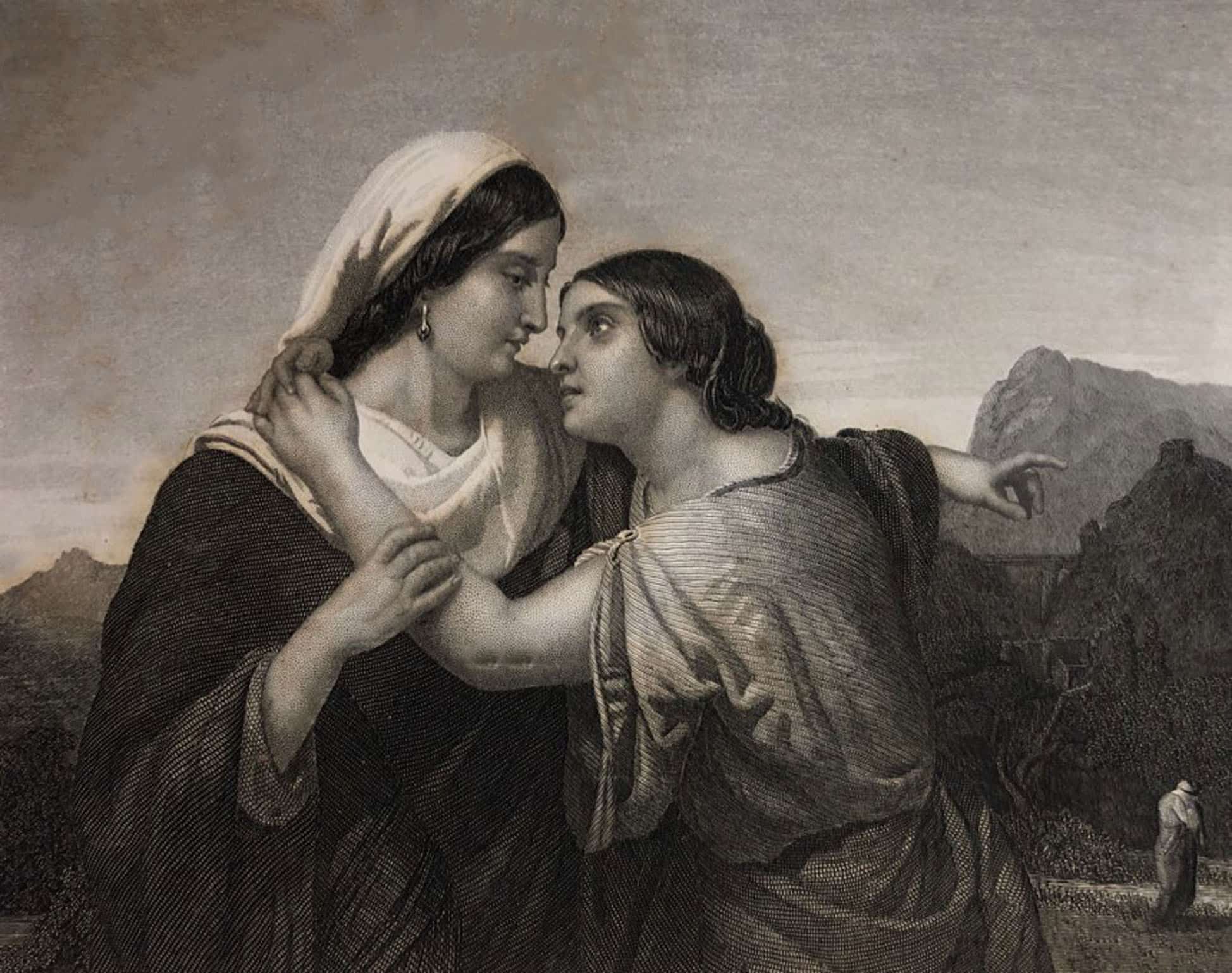 Ruth and Naomi from Young People’s Bible History – 1873 (Campwillowlake/Getty Images)
Ruth and Naomi from Young People’s Bible History – 1873 (Campwillowlake/Getty Images) Shlomo Carlebach would relate an anecdote about his visits to college campuses in the 1970’s. After finishing a concert, he would ask the students he met what religion they were. Some would say they were Roman Catholic, while others would say they were Protestant. But other university students would answer his question by saying, “I am a human being.” To which Carlebach would immediately respond: “you must be a Jew!”
The answer these students gave is not at all new, and echoes the words of the ancient philosopher Diogenes who, when asked where he came from, would declare “I am a citizen of the world.” This view is even more seductive now that we live in a global village, and what happens anywhere is broadcast everywhere. To identify with one small group feels parochial and narrow.
The Book of Ruth presents a dramatically different view than Diogenes, and offers a seminar on the importance of loyalty, of staying close to those who are closest to you.
The narrative of Ruth begins with an estrangement, a failure of loyalty. During a famine, a man named Elimelech and his family leave Israel and go to the plains of Moab. From later passages in the book, Elimelech’s prominence becomes clear; yet during a crisis, he chooses to leave his community behind to find greener pastures for himself. Rashi condemns Elimelech’s behavior and writes: “He was very wealthy, and the leader of the generation. He left Israel for a foreign land because of his stinginess, for he was miserly toward the poor who came to beg from him; therefore Elimelech was punished.”
Tragedy ensues. Elimelech dies, and his two sons, who then marry Moabite women, die as well. Naomi, Elimelech’s widow, decides to return to the land of Israel and to her hometown of Bethlehem. As she leaves, Naomi is accompanied by her two Moabite daughters-in-law, Ruth and Orpah. Mid-trip, Naomi stops and implores her daughters-in-law to return to their parents’ homes, because there’s no future for them in Israel.
Orpah accepts her mother-in-law’s advice, and tearfully bids her farewell. But Ruth refuses to go. She remains at Naomi’s side, even though her mother-in-law has excused her, and exhorted her to leave. In two short sentences,(Ruth 1:16-17,) Ruth expresses a profound depth of loyalty: “Don’t urge me to leave you or to turn back from you. Where you go I will go, and where you stay I will stay. Your people will be my people and your God my God. Where you die I will die, and there I will be buried. May the Lord deal with me, be it ever so severely, if even death separates you and me.”
In a comment that further highlights the theme of loyalty, the Midrash finds fault in Orpah’s behavior. It connects her name to the Hebrew word oreph, the back of the neck. In the Midrash’s view, Orpah is too quick to turn her back on Naomi, especially when her own sister-in-law continues forward.
Ruth’s loyalty to her mother-in-law is all the more remarkable considering that she is a Moabite, from a nation that descended from Lot, Abraham’s nephew. Lot and Abraham share the journey from Aram to Canaan, then to Egypt and back. They are truly like brothers. But then they separate over a business dispute.
This separation grows deeper with time. After the Exodus, when the Jews are journeying from Egypt to the land of Israel, the Moabites refuse to offer them water and even engage Balaam to curse the Jews. Ruth’s lineage is from a nation who have turned their backs on Abraham’s family, which makes Ruth’s loyalty all the more remarkable.
The conclusion of the Book of Ruth is intertwined with two legal institutions that obligate relatives to help out their kin. One is yibum, the levirate marriage. When a man dies childless and leaves behind a widow, the brother of the deceased has an obligation to continue that man’s name and marry the widow. Marrying the widow to a family member, (who then has children with her,) ensures that the deceased brother will always be remembered, and his name will be carried on. (In the Book of Ruth, this legal institution is extended to include a close relative, Boaz, as well.)
The second institution is the redemption of a field. The Bible explains (Leviticus 25:25) that “If one of your fellow Israelites becomes poor and sells some of their property, their nearest relative is to come and redeem what they have sold.” This repurchase carries profound significance. In an agrarian society, identity is rooted in the land itself, which is transferred from generation to generation; when relatives repurchase these fields and return them to impoverished members of their family, they have returned them to their roots and given them dignity.
Both of these legal institutions are founded on the importance of loyalty, and reflect the unique obligations one has towards a close relative.
In the final chapter of the book, two men are confronted with these obligations: Boaz and Ploni Almoni (a pseudonym that means “anonymous.”) They are the ones who must redeem Naomi’s fields, and marry her widowed daughter-in-law Ruth. The anonymous Ploni Almoni is given priority because he is the closest relative; but he refuses, saying (according to the interpretation of Ibn Ezra and Ralbag) that he’s worried about a cash crunch, that if he acquires the new field he won’t have enough money to hire workers for all his properties.
Ploni Almoni puts his individual needs above his responsibility to his kin; and he remains anonymous to history, like a faded flower, like whirling dust. It is Boaz, who is loyal to his family and community, who together with Ruth becomes the foundation of the house of David, and the future of the Jewish nation.
The Book of Ruth’s emphasis on the obligations of loyalty contrasts sharply with a staunchly universalist ethic, which sees preferential love for a particular community as narrow and self-centered.
While moral universalism correctly demands that we treat everyone with dignity and justice, loyalty demands that we go a step further and make substantial sacrifices for kinfolk and compatriots. The moral argument for loyalty is grounded first in reality; to care about everyone is to care about no one in particular. Without preferential love, even basic relationships are impossible. Richard M. Hare pointed out that, even for universalists, If mothers had the propensity to care equally for all the children in the world, it is unlikely that children would be as well provided for even as they are. The dilution of the responsibility would weaken it out of existence. But the Book of Ruth goes further, well beyond a pragmatic acceptance of loyalty; instead, it celebrates the spiritual power of commitment.
Rabbi Dr. Samuel Lebens, in his book A Guide for the Jewish Undecided, sees Ruth’s conversion as a paradigm of authentic Jewish belief. Our identities always shape our perspective, or as Lebens puts it, “it is what makes reasoning possible to begin with.” He points out a fascinating contrast between the conversion of Ruth, (the only one found in the Tanakh,) and the conversion of Paul in the New Testament. As it is described in the Book of Acts, Paul comes to Christianity after he sees a grand vision on the road to Damascus, and suddenly the scales fall from his eyes. In contrast, the conversion of Ruth is founded on personal connection and familial love. On the road to Bethlehem, Ruth perseveres in her love for Naomi; and that draws her close to God and the Torah. It is her decision to commit to the Jewish people that transforms Ruth.
Faith grows out of our commitments, which is why the Book of Ruth is read on Shavuot. At the foot of Mount Sinai the Jews pledged “naaseh v’nishmah,” “we will do and we will listen.” In other words, the Jews were pledging to loyally follow God, and by doing so, understand the spiritual value of the Torah. Enlightenment is the product of one’s commitments. And so it was with Ruth.
But like the Carlebach’s college student, many young Jews find loyalty to be difficult. They have grown up in what psychologists call a WEIRD culture: Western, Educated, Industrialized, Rich, and Democratic, which, as Jonathan Haidt explains in The Righteous Mind, devalues loyalty. Calls for loyalty are often met with suspicion and derision. Even some young rabbis struggle with loyalty; they will dither in response to terror attacks and conflict in Israel, worried more about political implications than personal commitments.
It is not surprising that as the Jewish community becomes more immersed in a WEIRD culture, loyalty has diminished, as well as our community’s connection to Judaism and the Jewish people.
But on the road to Bethlehem, Ruth chooses loyalty. And that has made all the difference.
Rabbi Chaim Steinmetz is the Senior Rabbi of Congregation Kehilath Jeshurun in New York.






















 More news and opinions than at a Shabbat dinner, right in your inbox.
More news and opinions than at a Shabbat dinner, right in your inbox.